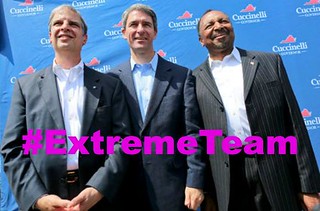 In this morning’s Richmond Times-Dispatch, Virginia Lt. Governor Bill Bolling talks about his ideas for getting Virginia’s Republican Party “back on track,” in the aftermath of “Democrats hav[ing] won seven of the past eight top statewide political campaigns in Virginia.”
In this morning’s Richmond Times-Dispatch, Virginia Lt. Governor Bill Bolling talks about his ideas for getting Virginia’s Republican Party “back on track,” in the aftermath of “Democrats hav[ing] won seven of the past eight top statewide political campaigns in Virginia.”
Bolling’s key idea is that Virginia Republicans “should never again nominate our candidates in closed party conventions,” as “too often result in the nomination of candidates who simply can’t get elected when judged by a broader Virginia electorate.” Instead, Bolling believes “we should nominate our candidates in open statewide primaries, where hundreds of thousands of people with differing viewpoints can participate,” the result being that “[i]nstead of being viewed as an exclusive party, we would then be viewed as an inclusive party that is focused on nominating candidates who reflect the diverse views of a changing Virginia.”
That sounds great in theory, but how does it work in reality? Here are three rebuttals to Bolling’s primaries-are-better-than-conventions theory (and note, I favor primaries as well, because they encourage for more people to get involved and force candidates to run serious campaigns).
Rebuttal #1. Christine “I am not a witch” O’Donnell: “O’Donnell won the September 14, 2010, primary election by six percentage points over Castle,[72] garnering more than 30,000 votes altogether, and becoming the eighth Tea Party-backed candidate to oust a GOP establishment candidate in a 2010 primary contest.” This far-right-wing nutjob candidate then went on to lose a winnable election, badly at that (57%-40%). So how did a primary help Republicans in Delaware in 2010? Uhhhh.
Rebuttal #2. Todd Akin: “Despite losing some momentum and in a crowded field, Akin won the Republican nomination in the August 7 primary, 36% to 30% for his nearest challenger.” Akin then went on to become the poster boy for Republicans on how to lose a totally winnable race against a weakened Democratic incumbent (Claire McCaskill), by talking about crazy stuff like “legitimate rape,” and by generally making it clear that he was somewhere to the right of Attila the Hun. The final result: McCaskill 55%-Akin 39%. Again, how did holding a primary help Republicans avoid disaster in the general election?
Rebuttal #3. Richard Mourdock: “On May 8, 2012, Mourdock defeated Lugar in the primary, capturing just over 60% of the vote. Mourdock’s victory was attributed in part to voter dissatisfaction with Lugar’s moderate record as well as his absence from Indiana; he had not had a residence in the state since 1977.” After doing his best Todd Akin imitation, for instance talking about how “life is that gift from God that I think even if life begins in that horrible situation of rape,” Mourdock lost the general election by 7 points (50%-43%), even as Barack Obama was losing Indiana. Yet again, I ask how holding a primary helped Republicans avoid electoral disaster in November?
Bottom line: Virginia Republicans have a lot more problems than their method of nominating candidates. For starters, they’ve mostly alienated African Americans, Latinos, Asian Americans, federal employees, moderates, LGBT Virginians, non-religious-fundamentalist folks, and many women and young people based on their extreme, anti-science, theocratic, and “trickle-down” policies and intolerant rhetoric. That’s not exactly a winning formula, and it’s certainly not something that can be solved by holding primaries rather than conventions.


















